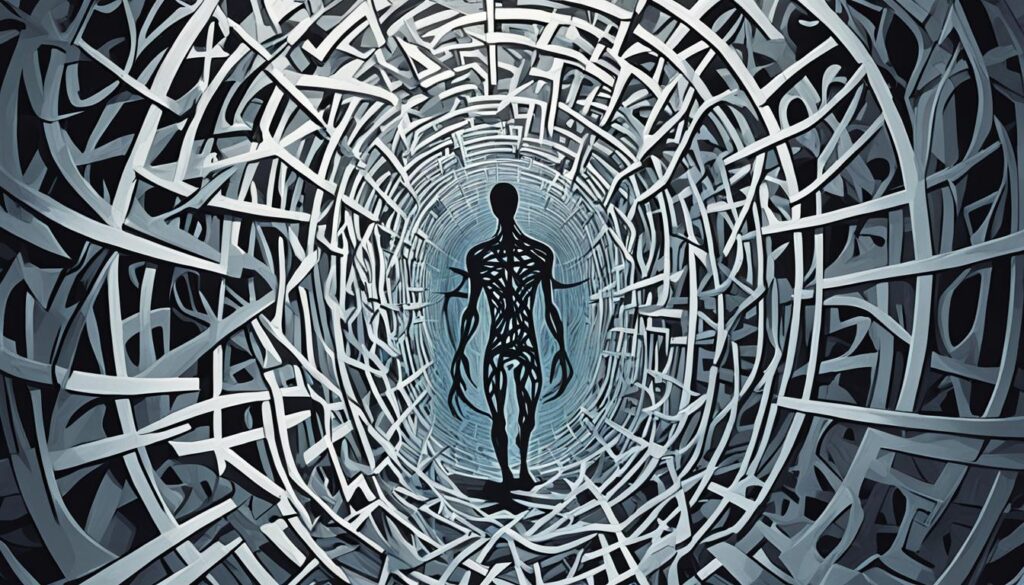In 1980, Stan and Christina Grof first used the term “spiritual emergency.” They showed how deep spiritual experiences can affect us. These experiences can lead to a mental and emotional issue called spiritual psychosis. This issue makes it hard to tell what’s spiritual and what’s not.
Spiritual psychosis happens where the spiritual and psychological meet. People may see visions, have mystical experiences, or feel a strong connection to something divine. This can make it hard to live a normal life. It’s different from other mental health issues because it’s tied to the person’s spiritual life.
Spiritual psychosis can show in many ways. Some might hear or see things that aren’t there. Others might think they’re very important or that people are out to get them. They might feel very happy or very sad, all because of their beliefs.
what is spiritual psychosis

Spiritual psychosis is when deep spiritual experiences make someone feel out of balance. It’s seen in many cultures and times. People call it mystical experiences, shamanic crises, or strong religious feelings.
Now, in psychology, it means a person’s spiritual path or acts, like deep meditation or fasting, cause their mind to break. This can make them see things that aren’t there, think strange thoughts, and feel lost. Some call this a “spiritual emergency.”
Studies show that psychosis often starts in teens or young adults. It’s called the “sickness of the self.” It’s more common in people who move to a new country. But, not all spiritual experiences end in psychosis. Many bring positive changes and a deeper sense of purpose.
Spiritual emergence and psychosis are on a scale of changed states of mind. Some states are positive, others are not. Treatment should help the state move naturally and support creativity. It should also understand the differences and similarities between spiritual crises and psychosis.
Understanding Spiritual Psychosis

Spiritual psychosis starts as real spiritual experiences. But if not handled right, it can turn into a state like psychosis. This affects both the person and their community a lot.
For the person, it means losing daily life skills, breaking relationships, and feeling a lot of pain. In the community, it leads to stigma, making people feel alone, and not getting the right help. It’s hard to tell when it’s a spiritual awakening or a psychotic episode. We must understand this to help and support the right way.
Dr. Ronald D Laing found that some people thought to be psychotic might be having spiritual experiences. Sadly, they were treated badly with things like frontal lobotomies and electroconvulsive therapy. This made things worse for them.
A real spiritual awakening is about waking up the deep inner part of us. It’s about finding our true nature. This is very different from psychosis. Knowing the difference helps us give the right support and advice.
The Impact of Spiritual Psychosis

Spiritual psychosis can deeply affect people and their communities. It can make daily life hard, hurt relationships, and cause a lot of worry. Without help, it can lead to ongoing mental health issues.
In communities, not understanding spiritual psychosis can make people feel left out and alone. It can also mean not getting the right kind of help. It’s important to understand and help those with this condition to aid in their recovery.
Recent studies have looked into spiritual psychosis. They found it’s different in some ways from other kinds of psychosis. People with spiritual psychosis often feel things like tastes and touches that aren’t there. They might also hear voices that make them feel good.
These people can also control these feelings more than others with psychosis. This shows a special bond between them and their spiritual feelings. This bond might come from their culture or personal beliefs.
Symptoms of Spiritual Psychosis

People with spiritual psychosis may show signs that are worrying. They believe things that aren’t true, like thinking they have a special mission also feel like they’re being targeted by bad spiritual forces.
You might hear voices or see things that they think are messages from above. They could also feel like they’re not wanting to be around others and might get agitated easily. Also they have trouble sleeping.
Not all spiritual experiences mean someone has psychosis. But if these experiences mess up their daily life and they show the signs mentioned, they might need help. A professional should check and support them.
Predisposing Factors for Spiritual Psychosis

Some things can make a person more likely to get spiritual psychosis. These include things like biology, mind, and environment. Research says these things can work together to cause this condition.
Having family members with mental health issues like schizophrenia or bipolar disorder is one factor. This can change how someone handles stress and spiritual feelings. It makes them more likely to have strong mental reactions during deep spiritual activities.
Studies show people with schizophrenia or schizo-affective disorder who use religion can live better lives. But, they might feel more sad and guilty as they understand their condition better.
Other things like bad life events or not knowing how to practice spirituality can also lead to spiritual psychosis. Mixing spirituality with mental health care can help people feel better. But, it can also make treatment harder.
Knowing what can lead to spiritual psychosis helps us find ways to stop it. By looking at biology, mind, and environment, doctors can help people more. This helps everyone get better and stay well.
Treatment Approaches for Spiritual Psychosis
Dealing with spiritual psychosis needs a mix of ways. Cognitive Behavioral Therapy (CBT) is one good way. It helps change bad thinking patterns. This makes it easier to tell what’s real from what’s not.
CBT also teaches ways to handle stress and anxiety from spiritual feelings.
Sometimes, strong symptoms need medicine. Antipsychotic drugs can lessen hallucinations and false beliefs. But, how these drugs affect people can be different.
Other ways like mindfulness, meditation, yoga, and exercise are also important. They help with stress and help people connect with their feelings. This can help them get better.
There’s no single best way to treat spiritual psychosis. What works best can depend on the person. Working together with doctors, mental health experts, and loved ones is key to finding the right treatment.
Psychosis: Understanding the Broader Context
Psychosis is a complex condition that affects how our brains work. It makes people lose touch with reality. People may see or hear things that aren’t there, believe strange things, or have mixed-up thoughts and actions.
About 75-90% of the time, psychosis doesn’t last forever. Most of the time, it goes away on its own. This shows us that psychosis is more than just a serious mental illness.
Many things can cause psychosis, like mental illnesses, injuries, or too much stress. Trauma and stress can make it more likely to have psychosis. Also, people with psychosis often have more inflammation in their bodies, which might be linked to autoimmune diseases.
Research on psychosis is looking at the role of spirituality. They’re changing how we see mental illness. Now, therapy like Acceptance and Commitment Therapy (ACT) includes spirituality. This is even being used in the British National Health Service.
People with traits of psychosis might be more creative and spiritual. Studies show that psychotic, spiritual, and creative experiences are different. This tells us we need to understand these better.
We’re learning that treating psychosis needs a full approach. By seeing psychosis as complex, we can help people better. This way, we can offer care that really meets their needs.
Stages and Types of Psychosis
Psychotic disorders often start in late teens or early twenties. Before the first episode, you might see small changes in your thoughts and actions. This is called the prodromal phase.
This phase can last from days to years. You might have trouble focusing, sleep poorly, or feel suspicious.
The typical course of psychosis has three stages: the Prodrome Phase, the Acute Phase, and the Recovery Phase. In the Acute Phase, you might see or hear things that aren’t there. You might also have strange thoughts or act differently.
With the right treatment, most people get better in a few weeks or months. Symptoms lessen or go away.
Recovery means learning about your strengths and weaknesses. It’s about getting back to a good life with help from loved ones. This journey is personal and helps move past the old idea that psychosis is a lifelong problem.
Psychosis can take many forms, like postpartum or menstrual psychosis. Each type needs its own treatment plan.
Everyone’s experience with psychosis is different. This shows why a personal approach is key to dealing with it. With support and treatment, getting better from psychosis is possible. It’s about using your strengths to live a full life.
Potential Causes of Psychosis
Psychosis is a mental health issue with many possible causes. Researchers have found several things that might lead to psychotic episodes. But, we don’t know everything yet.
Genetics are a big part of psychosis. If your family has mental health issues like schizophrenia or bipolar disorder, you might be more likely to have psychotic symptoms. Stress, like trauma, anxiety, or deep sadness, can also make some people have psychotic episodes.
Some medical issues can cause psychotic symptoms too. These include head injuries, brain tumors, strokes, and certain brain disorders. Using drugs like hallucinogens, stimulants, or a lot of marijuana can also trigger psychosis. This is more likely in people who are already at risk because of their genes or mental health.
Knowing what causes psychosis helps with early treatment. Doctors can make plans to help people based on these causes. Regular visits to mental health experts and talking openly with them are key to staying mentally healthy. This helps stop psychotic episodes from getting worse.
Recognizing the Warning Signs of Psychosis
Psychosis doesn’t start suddenly. It usually follows a pattern. You or your loved ones might notice changes in how you see the world. These changes can make your grades or job performance drop.
It can also make thinking clearly or concentrating hard. You might feel suspicious or uneasy around others. Or you might not take care of yourself or your living space.
You might spend more time alone than usual. Or you might feel emotions that are too strong for the situation. Or you might not feel emotions at all.
About 100,000 young people get psychosis each year. As many as 3 in 100 people will get psychosis at some point in their lives. It usually starts between 18-25 years old, but can start between 15-40 years old.
It’s rare for psychosis to start in childhood. The early signs of psychosis can last for months to a year or more. Getting help early can help you fully recover.
Studies show that treating psychosis early makes it easier to control. If you see signs of psychosis, getting help right away is key to getting better.
The Transpersonal Perspective in Psychiatry
The transpersonal perspective in psychiatry looks at spiritual psychosis in a new way. It sees altered states of mind that seem psychotic but are really part of a spiritual change.
Abraham Maslow, Ken Wilber, and Stanislav Grof led the way in this field. They talked about reaching beyond our usual selves to connect with something bigger.
They showed how we can grow and learn by exploring our inner selves. This includes finding spiritual parts of us.
Therapies like meditation and mindfulness help people grow and understand themselves better. They aim to reach deep into our minds for personal growth and spiritual growth.
This view in psychiatry helps us see spiritual experiences in a new light. It means we can care for people in a more complete way. This is especially true for those going through spiritual changes that might look like psychosis.
The DSM-IV Category of Religious or Spiritual Problem
The DSM-IV has a special category called “Religious or Spiritual Problem” (Code V62.89). This was made by experts in spiritual growth. They say that feeling lost or questioning faith can be normal, not just a sign of illness.
This category is important for mental health checks. It helps tell apart spiritual struggles from mental health issues. This is key in places where faith is a big part of life.
It’s helping mental health workers understand their patients better. They need to know about the spiritual beliefs of their patients.
More research is being done on how spirituality and mental health connect. Studies show that being religious can make people happier and less stressed. But, we still have a lot to learn, especially in different parts of the world.
